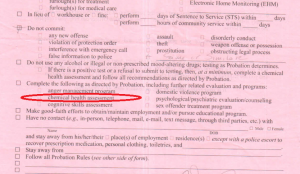If you’re in court for a DWI (or other alcohol or drug-related crimes), you’re going to need to get a chemical health assessment. This assessment, commonly referred to as a “chemical health evaluation,” “CD eval,” or “Rule 25,” looks at your drug and alcohol history and past behaviors involving substances.

What is It?
The “ Rule 25” follows a specific form produced and promoted by the state.
It is long interview process that asks for a lot of information about your history of drug and alcohol use, whether you should or are likely to moderate your use, and what sorts of consequences your use has led to.
It ends with the “Assessor’s Recommendation” based on the information you provide: generally attendance at AA, an education program, MADD panel, outpatient treatment, or, in some cases, in-patient chemical dependency treatment.
Do I Have to Have One?
First-time or low level offenders with drug or alcohol related crimes –DWI, disorderly conduct, possession — are always ordered to undergo some sort of chemical dependency evaluation, either as part of a pre-sentence investigation (PSI) or as a term of probation (see Figure 1).
Having a professional, quality, state-approved assessment will be key in determining what the Probation department will recommend the judge order as part of your sentence
The state’s “Rule 25” assessment form should be only one of many chemical dependency / chemical assessment tools that are used during your assessment process. A good chemical dependency assessor will also gather additional information to look out for your best interests, in order for your assessment (and the recommendations) to suit your particular needs.
Having a professional, quality, state-approved assessment will be key in determining what the Probation department will recommend the judge order as part of your sentence or, if the Rule 25 is part of probation, what Probation orders you to do to as a condition of avoiding executed jail time (actually serving time in lockup).
What Else Do I Have To Do?
What assessments or interventions you sign up for are largely determined by the county of your alleged offense. Most counties want to see some type of corrective action taken when there are alcohol and drugs involved in your case.
Different counties recommend different programs. Hennepin County (downtown) likes to sentence people to the Hennepin County One-Day DWI program, ($355 required program that has absolutely no clinical or therapeutic value). The suburban courts like 8- or 12-hour “education” or “Driving with Care” or Adult Substance Use and Driving Survey (ASUDS) programs.
Getting your Rule 25 done on your own allows you to choose an assessor whom you feel more comfortable with and who might understand your particular circumstances
You might also be ordered to attend a MADD Victim Impact panel or to provide random urine samples as a condition of probation.
When Should I Get My Rule 25 Done?
I advise clients to get their chemical dependency evaluation handled before the court orders it.
Getting it done ahead of time shows the judge or probation officer that you are going to cooperate with probation and treatment recommendations (as necessary). It also shows that you accept responsibility for your substance use.
Who Should Do My Rule 25?
Choose someone yourself! Getting your Rule 25 done on your own allows you to choose an assessor whom you feel more comfortable with and who might understand your particular circumstances (people who resent the Rule 25 just lie to the assessor about their use history).
I have recently begun working with Amy Fitzgerald, a licensed chemical dependency counselor who has worked inside the court system. Amy brings that perspective to her independent chemical health assessments. Amy also offers “mobile assessments”: she comes to your home or office to complete the evaluation (if you’re one of my clients, you and Amy can use our conference room). Transportation can be difficult when you’re dealing with a recent DWI charge, so Amy’s “Mobile Assessments,” can mean the difference between getting the Rule 25 done on time or not.
Written with assistance from Amy Fitzgerald, LADC
Is a rule 25 the better way to go to go vs mn sure to get quality rehab services paid for? My young son has a cple pending cases both were because he was under the influence, he wants help and I want him to succeed with the best help possible, he didn’t have insurance at the time I was looking into rehab for him they mentioned a rule 25. I have set up a rule 25 for him and he now has health coverage. Which would be better when looking into quality of care and benefits differences between the two. Thanks for your time, if you don’t know would you know who to ask?? Thank you
How to pay for a chemical dependency evaluation or chemical dependency treatment depends on how much you can afford to pay, whether your insurance will cover it, and whether you want your medical provider to have the information.
Can a rule 25 assessor have the right to be doing this kind of work with clients when the rule 25 assessor has a drug charge with intent to sell and that is on supervised probation till 2030??
Licensing requirements for providing Rule 25 assessments are determined by statute and by the Department of Human Services. Your question would be best directed to them.
The short answer here is no. The place to go for information in Minnesota Board of Behavioral Health and Therapy as they license those capable of doing a Rule 25. https://mn.gov/boards/behavioral-health/
What would happen if someone did not pay for their assessment?
-Thank You